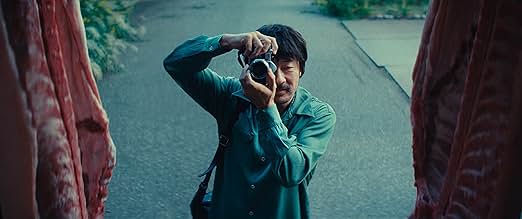Füge eine Handlung in deiner Sprache hinzuThe dark fantasy love story of legendary Japanese photographer Masahisa Fukase and his wife Yoko.The dark fantasy love story of legendary Japanese photographer Masahisa Fukase and his wife Yoko.The dark fantasy love story of legendary Japanese photographer Masahisa Fukase and his wife Yoko.
- Auszeichnungen
- 1 wins total
Fotos
Handlung
Ausgewählte Rezension
I am privileged to say I was amongst the first people in the world to see Ravens be premiered at the Austin Film Festival. This film was unequivocally one of the best of the decade, Mark Gill truly showed his love for Japanese film and cemented himself as one of the best directors of the year.
To start off, the most striking thing was the screenplay. As an art history student, I was always familiar with Masahisa Fukase. The screenplay did a wonderful job of at interconnecting his personal life and the growth of his art. The writing focused more on the characterization of Masahisa and his wife instead of following the traditional linear structure of the West - which is my opinion was the best thing they could've done. The non-linear almost psychodynamic scenes that broke the structure truly encapsulated the torment of Masahisa's mind and made the manifestation of the actual Raven more believable in the world that was created.
The writing of the Raven itself - a physical manifestation of Masahisa's mind was done with masterful intent. The Raven's dialogue- always mocking and condescending was believable, the worlds masterfully mimicked the mind of a doubtful artist. Even the ending scene, the choice to not end with Masahisa's art or the world after his death but his demise itself as he was no longer able to make his art was rewarding.
The cinematography is also what puts this film one step above the rest. The striking juxtaposition of warm and cold visuals were evocative of modern Japanese films. The camera work, specifically during scenes of drug and alcohol use were wonderful - the camera physically acted as his distorted mind. The color grading gradually becoming more cold as his marriage progresses was peak visual storytelling. The scenes in the flashbacks, the natural sunlight always on Will in her youth was so comforting. I will go as far to argue that next to Anora, the color grading/cinematography of Ravens is the only competitor. In a world of Airbnb colored films, this world was as artfully colored as Fukase's mind.
I urge anyone with the opportunity to go and see this film. This film checks all the marks for what Western filmmaking is currently missing and why films like The Brutalist and Blitz could run for hours but the emotional connection to the audience will never be enough. Film is the medium, the screenplay is the foundation and this film does a wonderful job at knowing when to break the traditional conventions of both.
To start off, the most striking thing was the screenplay. As an art history student, I was always familiar with Masahisa Fukase. The screenplay did a wonderful job of at interconnecting his personal life and the growth of his art. The writing focused more on the characterization of Masahisa and his wife instead of following the traditional linear structure of the West - which is my opinion was the best thing they could've done. The non-linear almost psychodynamic scenes that broke the structure truly encapsulated the torment of Masahisa's mind and made the manifestation of the actual Raven more believable in the world that was created.
The writing of the Raven itself - a physical manifestation of Masahisa's mind was done with masterful intent. The Raven's dialogue- always mocking and condescending was believable, the worlds masterfully mimicked the mind of a doubtful artist. Even the ending scene, the choice to not end with Masahisa's art or the world after his death but his demise itself as he was no longer able to make his art was rewarding.
The cinematography is also what puts this film one step above the rest. The striking juxtaposition of warm and cold visuals were evocative of modern Japanese films. The camera work, specifically during scenes of drug and alcohol use were wonderful - the camera physically acted as his distorted mind. The color grading gradually becoming more cold as his marriage progresses was peak visual storytelling. The scenes in the flashbacks, the natural sunlight always on Will in her youth was so comforting. I will go as far to argue that next to Anora, the color grading/cinematography of Ravens is the only competitor. In a world of Airbnb colored films, this world was as artfully colored as Fukase's mind.
I urge anyone with the opportunity to go and see this film. This film checks all the marks for what Western filmmaking is currently missing and why films like The Brutalist and Blitz could run for hours but the emotional connection to the audience will never be enough. Film is the medium, the screenplay is the foundation and this film does a wonderful job at knowing when to break the traditional conventions of both.
- sasharamaix
- 29. Okt. 2024
- Permalink
Top-Auswahl
Melde dich zum Bewerten an und greife auf die Watchlist für personalisierte Empfehlungen zu.
Details
- Laufzeit1 Stunde 57 Minuten
- Seitenverhältnis
- 2.35 : 1
Zu dieser Seite beitragen
Bearbeitung vorschlagen oder fehlenden Inhalt hinzufügen




















